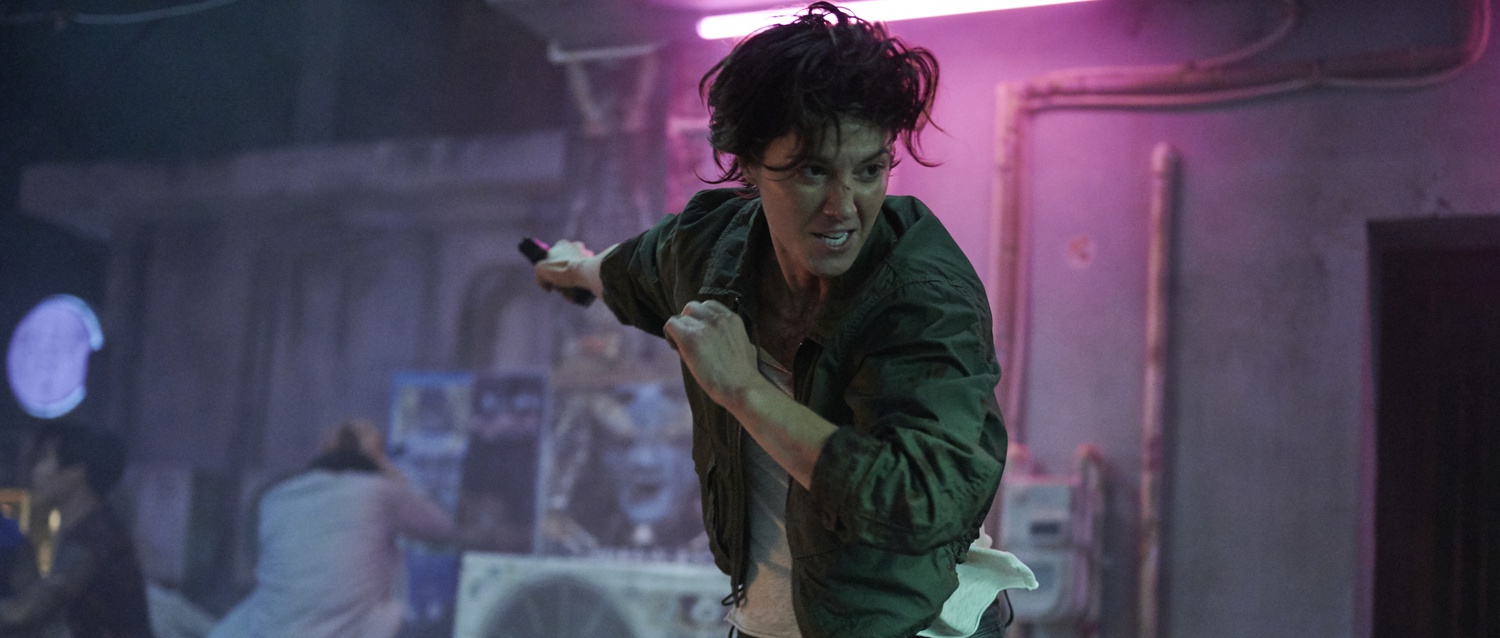
News
Summers Will Not Finish Semester of Teaching as Harvard Investigates Epstein Ties

News
Harvard College Students Report Favoring Divestment from Israel in HUA Survey

News
‘He Should Resign’: Harvard Undergrads Take Hard Line Against Summers Over Epstein Scandal

News
Harvard To Launch New Investigation Into Epstein’s Ties to Summers, Other University Affiliates

News
Harvard Students To Vote on Divestment From Israel in Inaugural HUA Election Survey
‘Kate’ Review: Vibrance, Violence and Kinship
Dir. Cedric Nicolas-Troyan — 4 Stars

Gory, action-packed, and emotionally resonant, the new Netflix thriller “Kate” asks how much you could change if you only had one day left to live. The creative cinematography, the set design that contrasts dark streets and popping neon, and the original fight scenes alone make “Kate” worth a watch — but its plot is clever too.
“Kate” is a revenge story. And ordinarily, revenge stories can be boring: they have limited potential outcomes (either the person seeking revenge succeeds or not) and usually come to the conclusion that revenge is futile anyway. All in all, it’s a trope that is easy to make trite and banal, especially since it requires someone dying tragically enough that everyone else can be sad about it for two hours, but not so tragically that the viewer should care about the victim as an individual. “Kate,” however, sidesteps these pitfalls magnificently: The death she is avenging is her own, so no one is fridged, and the central question is far more about family and self-actualization. In fact, here revenge is just a vehicle for awesome fight scenes.
Titular protagonist Kate, portrayed by Mary Elizabeth Winstead, is an assassin ready to retire from the job when she is poisoned — she has 24 hours left to live and wants vengeance before she kicks the bucket. Instead of her fixation squandering the last of her time, it gives her final hours structure so that she can reflect on her life and make changes. Considering Kate has so little time remaining, it’s impressive that the film manages to place an emphasis on growth. The film’s genius lies in its message that no one lives in a vacuum — your choices and actions affect other people. This is a delightful reversal of the “grim, stoic assassin only works alone” trope and creates an emotional journey that is very well-executed.
Moreover, Kate’s character takes a beating. She receives every injury imaginable while taking part in half a dozen different types of fisticuffs, all while slowly dying from poison and using makeshift medicines to overcome the pain. The nonstop hits can feel a bit overdone when Kate gets whacked over the head over and over again, but considering this is a movie about death, perhaps the slightly cartoonish injuries are underscoring the fact that Kate no longer has to worry about preserving her body for the future.
Against her wishes, Kate is not alone for her emotional journey. She ends up looking after the teenaged Ani (Miku Patricia Martineau) who she has a complicated history with. Martineau’s acting is excellent as her character navigates loss, joy, and despair. She and Kate form a fraught surrogate relationship that manages to cover a lot of ground, particularly considering their lack of time together. This relationship both provides Kate with a companion and forcefully combats her down-trodden, violent tendencies, injecting the film with much needed levity and fun.
At its core, however, “Kate” is an R-rated action movie. And in this way, it excels. It’s equal parts bloody and gratuitous and well-choreographed and shot. The staging of each fight scene is distinct and creative — from a bloodbath in a restaurant to one with weaponized kitchen utensils to a gutsy street-side shoot-out.
The setting features neon pop contrasted with dark, grimy streets, creating an evocative and dynamic viewing experience as Kate barrels through the criminal underworld. None of the action is hidden from the viewer (thankfully “Kate” understands “dark and gritty” does not mean you should fire your lighting crew). Unfortunately, beyond some vague aesthetics, we don’t actually see much of Japan, where the film takes place. While “Kate” does explore a bit of fictionalized Japanese street politics and some complicated heritage through the character of Ani, it’s a shame it doesn’t consider Kate’s role as a tourist who is dying in a foreign country. All around, the film could have had more meaningful Japanese representation — while there are many minor Japanese characters, the primary characters are white Americans.
“Kate” gets off to a choppy start as they clumsily set up the protagonist’s history, but once the plot picks up this issue does not recur. There are also some obvious plot twists and running gags that don’t pay off particularly well, but the overall product forgives some of these sloppier moments.
“Kate” is a fun, cathartic, bloody experience from beginning to end. It tells the story of revenge and redemption, of family, and of recovering from your past and choosing who you want to be — even if you’ve only got one day to achieve it. It shows how much your legacy can matter, and how you can be a positive or negative force for those you leave behind. And if nothing else, it’s worth a watch for the clever and gory action.
—Staff writer Millie Mae Healy can be reached at milliemae.healy@thecrimson.com.
Want to keep up with breaking news? Subscribe to our email newsletter.
